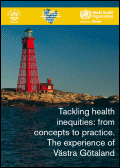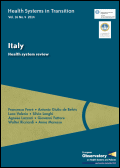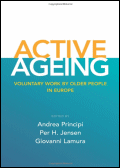 SELECTED FOR YOU... JANUARY 2015
SELECTED FOR YOU... JANUARY 2015
 books of the month
books of the month
 watch on health economics
watch on health economics
All the Selected for you
BOOKS
Tackling health inequities : from concepts to practice. The experience of Västra Götaland.
Organisation Mondiale de la Santé. (O.M.S.). Bureau Régional de l'Europe. Copenhague. DNK
Copenhague : Office des Publications du Bureau Régional de l'Europe, 2014
Malgré des améliorations remarquables dans le domaine de la santé, des inégalités persistent entre les pays comme au sein des pays de la Région européenne de l'OMS, et la Suède ne fait pas exception à la règle. Des interventions visant à lutter efficacement contre le manque d'équité en santé doivent être menées à tous les niveaux des pouvoirs publics. Les régions ont un rôle clé à jouer, car elles sont proches de leurs populations, et disposent du pouvoir et des compétences nécessaires pour élaborer des politiques de santé publique efficaces et susceptibles de réduire les disparités sanitaires en modifiant la répartition des déterminants sociaux de la santé. Ce rapport décrit le processus engagé par le comté de Västra Götaland (Suède) pour intégrer l'équité en santé dans son plan sanitaire régional, une initiative qui a abouti à l'adoption du Plan d'action pour l'équité en santé au Västra Götaland. Cette publication fait non seulement état des facteurs qui ont permis l'élaboration du plan d'action, mais également des obstacles rencontrés et des mesures prises pour les surmonter. Le rapport montre comment les approches pangouvernementales et pansociétales, qui sont au coeur de la nouvelle politique européenne de la santé, Santé 2020, ont été adoptées dans un contexte réel.
Health system review : Italy.
Ferre F., Belvis A.G. de), Valerio L. et al.
Copenhague : OMS Bureau régional de l'Europe, 2014
The Health Systems in Transition (HiT) series provide detailed descriptions of health systems in the countries of the WHO European Region as well as some additional OECD countries. An individual health system review (HiT) examines the specific approach to the organization, financing and delivery of health services in a particular country and the role of the main actors in the health system. It describes the institutional framework, process, content, and implementation of health and health care policies. HiTs also look at reforms in progress or under development and make an assessment of the health system based on stated objectives and outcomes with respect to various dimensions (health status, equity, quality, efficiency, accountability). Faced with rising regional deficits and austerity budgets focused on reduced public spending, the Italian National Health Service has been grappling with a dual challenge: containing or even reducing health expenditure while at the same time dealing with greater demand for its services. To date, these efforts have managed to be successful - regional deficits are now largely under control and the benefit package continues to be delivered effectively, albeit with much more tightly stretched resources and increased cost-sharing for some services. Italy's belt-tightening responses to its fiscal crisis have also exacerbated the existing inequity across regions, where gaps in service provision and health system performance persist. Government policies have focused on setting caps on pharmaceutical spending, reducing the number of hospital beds and shifting care away from acute stays, increasing co-payments and instituting new purchasing contracts for medical goods. A major policy tool has been the adoption of ‘financial recovery plans' by high-deficit regional health systems, targeting the structural determinants of costs, as well as national ‘health pacts' binding regions to budgetary discipline. However, the overt focus on financial retrenchment should not overshadow the need for longer term strategies for better health system performance, such as efforts to promote greater group practice among health professionals working in primary care, bolstering the quality of professionals managing public facilities, and ensuring that the concentration of organizational control by regions of health care providers does not stifle innovation.
Active ageing : voluntary work by older people in Europe.
Principi A., Jensen P.H., Lamura G.
Bristol : Policy Press, 2014
Active ageing' has become a key phrase in discourses about challenges and remedies for demographic ageing and the enrolment of older adults into voluntary work is an important dimension of it. The pattern and factors conditioning volunteering among older people has so far been an under-researched topic in Europe and this is the first book to study volunteering among older people comparatively and comprehensively In this topical book older people's volunteering is studied in eight European countries at the structural, macro, meso and micro levels. Overall it highlights how different interactions between the levels facilitate or hinder older people's inclusion in voluntary work and makes policy suggestions for an integrated strategy. This book provides important new insights for academics and students interested in ageing societies, active ageing and voluntary work. It will also be of great value for policy makers and practitioner in third sector and voluntary organisations.
Facets of Public Health in Europe.
Recherl B., Mckee M.
Maidenhead : Open University Press, 2014
Depuis 2 siècles, la santé publique atténue l'impact des maladies infectieuses et limite leur prévalence, mais il reste beaucoup à faire pour juguler les maladies non transmissibles comme les maladies cardiaques et le cancer, qui représentent le gros de la charge de maladies pesant sur la Région européenne de l'OMS. Cet ouvrage appréhende la santé publique en Europe de manière générale, mais avec force détails, et propose l'analyse la plus complète qui soit sur la Région. Il aborde un très large éventail de thèmes clés dans le domaine de la santé publique et comprend des chapitres sur : le dépistage ; la promotion de la santé ; la gestion des déterminants sociaux de la santé ; l'évaluation de l'impact sanitaire ; les travailleurs de la santé publique ; la recherche en matière de santé publique. En outre, les auteurs étudient les structures, capacités et services de santé publique existants dans toute une série de pays européens, en déterminant ce qu'il faut faire pour intervenir plus efficacement et améliorer les réalisations en matière de santé publique. Ce livre, qui reflète la vaste envergure géographique de toute la Région européenne de l'OMS, prend des exemples dans toute une série de pays pour illustrer les différentes façons d'envisager la santé publique. Il constitue une lecture essentielle pour tous ceux qui étudient la santé publique ou travaillent dans ce domaine, en particulier pour ceux qui s'intéressent aux pratiques européennes.




